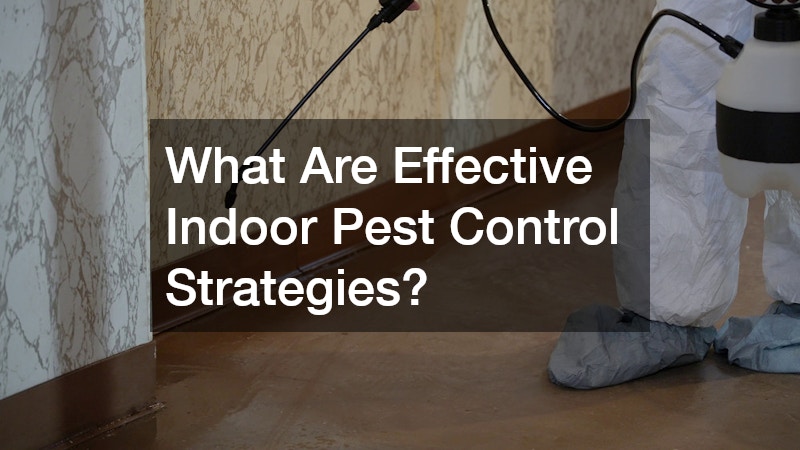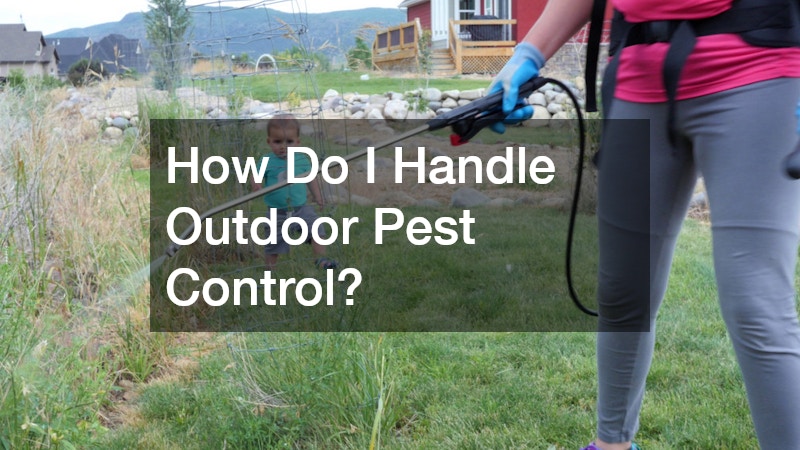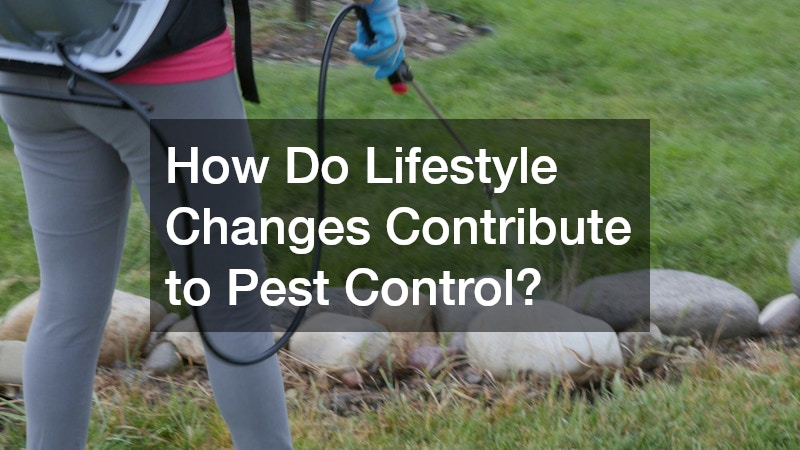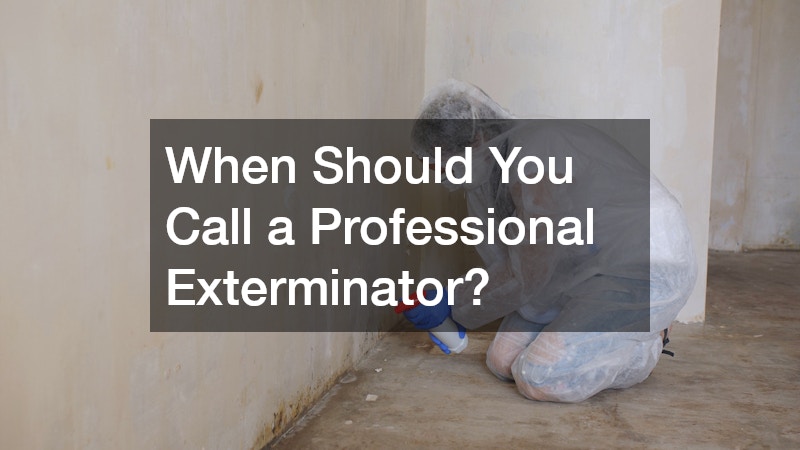Pests in the home are more than just a nuisance. They can damage your property, pose serious health risks, and lead to ongoing expenses if not properly managed. While professional exterminators provide reliable treatment, repeated visits can become costly and disruptive. Fortunately, a combination of preventative strategies and smart pest management can help homeowners eliminate current infestations and significantly reduce the chances of pests returning. From natural methods to advanced technology, there are a wide variety of ways to get rid of pests and avoid the need for future exterminator visits.
What Are Common Household Pests?
Identifying Common Pests
Household pests come in many forms, each with unique characteristics and behaviors. The most frequent invaders include ants, cockroaches, rodents, termites, spiders, and mosquitoes. More troublesome intruders, such as bats and wildlife, may occasionally enter attics or crawlspaces. In these cases, seeking help from a specialized wildlife removal company is often necessary to safely and humanely remove the animal. For more routine issues, pest control services typically offer targeted solutions for a variety of pest types.
Seasonal Pest Variations
Pest activity tends to increase or decrease based on seasonal changes. Ant infestations and mosquito problems tend to spike during the warmer months. For homeowners dealing with these issues, scheduling a mosquito control service in the spring can significantly reduce breeding populations and bite risks. Similarly, ant extermination is often most effective when timed at the start of their seasonal activity. During fall and winter, rodents and other animals look for warmth indoors, making rodent control especially important. Local rodent removal services can help address infestations before they become unmanageable.
Signs of Pest Infestation
Early identification of pest infestations can prevent further damage and reduce the need for major intervention. Signs include droppings, gnawed food containers, scratch marks, odd smells, insect wings, and even sounds coming from walls or ceilings. If you’re dealing with bats or rodents, you might hear nocturnal noises in attics or basements. Homeowners often discover these problems when retrieving stored items or doing routine cleaning. Being alert to these signs can prompt quicker pest control action and help avoid bigger issues.
Health and Safety Concerns
Pests can be more than annoying—they can carry diseases, cause allergic reactions, and lead to contamination. Rodents are known to transmit salmonella and hantavirus, while cockroaches can exacerbate asthma. Mosquitoes carry viruses like West Nile and Zika, making a mosquito control service essential in certain areas. Mold is another common result of pest-related moisture problems. A mold elimination service may be necessary when leaks or pest activity lead to damp conditions, which promote mold growth and pose health hazards.
Impact on Property
In addition to health concerns, pests can cause significant damage to your home. Termites and carpenter ants eat through wood, compromising structural integrity. Rodents chew through electrical wiring, increasing fire risks. Even seemingly harmless pests like ants can infiltrate walls and insulation, leading to costly repairs. The longer an infestation goes untreated, the more it can damage your property and lower its value.
Why is Pest Prevention Important?
Long-Term Cost Savings
Investing in preventative measures and routine inspections can save you considerable money in the long run. Repeated exterminator visits can quickly add up, especially when dealing with recurring infestations. By focusing on pest control prevention, homeowners can reduce the frequency and severity of infestations, thereby minimizing the need for expensive professional services.
Health Benefits
Preventing pests from entering your home supports a healthier living environment. Eliminating disease-carrying pests like rodents and mosquitoes reduces your family’s exposure to harmful pathogens. Mold associated with pest activity can also be addressed early through mold elimination service, further protecting your respiratory health.
Maintaining Property Value
A pest-free home is a better-maintained home. Properties with a history of termite damage or rodent infestations often appraise for less during resale. Routine pest control and prevention efforts help preserve structural integrity, appearance, and overall value.
Stress Reduction
Constantly battling pests can take a toll on your mental well-being. From sleepless nights caused by mosquito bites to the stress of seeing rodent droppings in your kitchen, pests create a persistent feeling of unease. Proactive pest control measures allow you to enjoy your home without the underlying anxiety of a possible infestation.
Eco-Friendly Considerations
Preventing pests using non-toxic and environmentally safe solutions is better for both your household and the planet. Using green pest control techniques and natural deterrents can reduce your reliance on chemical-based extermination methods, supporting a more sustainable lifestyle.
How Can I Natural Pest-Proof My Home?
Using Essential Oils
Essential oils such as peppermint, eucalyptus, citronella, and tea tree oil are known to repel many pests naturally. Peppermint oil, for instance, is particularly effective against spiders and mice. These oils can be diffused in the air or mixed with water and sprayed in problem areas to deter pests without harsh chemicals.
Natural Deterrents for Common Pests
Simple pantry items like vinegar, garlic, lemon, and coffee grounds can act as deterrents for a wide variety of pests. Mixing vinegar and lemon juice can discourage ants, while coffee grounds repel insects like beetles and fleas. These remedies are safe to use around children and pets and provide an inexpensive alternative to traditional treatments.
Safe Home Remedies
Homeowners can create safe pest control methods using basic cleaning supplies such as baking soda, dish soap, and salt. For example, a mixture of baking soda and sugar can be used to lure and eliminate cockroaches. Keeping a well-stocked cabinet of multi-use cleaning supplies helps you act quickly when early pest signs appear.
Environmental Adjustments
Pests thrive in cluttered, moist, and dirty environments. Reducing indoor humidity with dehumidifiers, repairing leaky pipes, and decluttering storage areas can drastically decrease the chances of an infestation. Natural lighting, airflow, and regular cleaning also play a significant role in making your home less inviting to unwanted guests.
Identifying and Sealing Entry Points
One of the most effective ways to prevent pests is by physically blocking their access to your home. Inspect windows, doors, foundation cracks, and rooflines for potential entry points. Caulking gaps and installing weather stripping can keep insects and rodents out, while mesh covers over vents and chimneys help prevent bat intrusion.
What Are Effective Indoor Pest Control Strategies?

Sanitation and Hygiene Practices
Keeping a clean home is essential to deterring pests. Crumbs, spills, and food residue can attract ants, cockroaches, and rodents. Regular vacuuming, disinfecting surfaces, and cleaning behind appliances help eliminate attractants. Sanitizing your home with non-toxic cleaning supplies also supports overall hygiene and pest resistance.
Proper Food and Waste Storage
Storing food in sealed containers and disposing of garbage frequently are key practices in preventing pest access to food sources. Pet food should also be stored in airtight containers, and compost bins must be managed properly to avoid attracting wildlife.
Use of Non-Toxic Traps and Baits
There are many safe and effective traps and baits on the market today. Sticky traps for insects, humane rodent traps, and bait stations using food-safe attractants offer ways to control pests without dangerous chemicals. Many local rodent removal professionals also offer eco-friendly options tailored to your specific infestation.
Regular Home Maintenance
Basic home upkeep such as repairing broken screens, fixing leaks, and sealing baseboards all contribute to a pest-resistant environment. Home maintenance routines should include inspections of attics, basements, and storage areas where pests are most likely to settle.
Importance of Professional Inspections
Even with the best DIY methods, professional inspections provide valuable insight and early detection. Pest control services can assess your home for hidden signs of infestation and recommend personalized prevention strategies. Annual inspections are especially important in areas known for termites or wildlife intrusion.
How Do I Handle Outdoor Pest Control?

Landscaping Tips to Discourage Pests
Trimming back vegetation, clearing debris, and maintaining a tidy lawn can help eliminate pest habitats. Overgrown bushes and piles of wood attract rodents and insects, while tall grass serves as hiding places for ticks and fleas. Strategic landscaping discourages pests from settling near your home.
Perimeter Pest Control Techniques
Creating a pest-free barrier around your property reduces the chances of indoor infestations. Applying natural repellents or approved treatments along the foundation, windows, and doors helps keep pests at bay. Some homeowners also invest in gravel or mulch borders to create an inhospitable zone for crawling insects.
Water Management Strategies
Standing water is a breeding ground for mosquitoes and other pests. Ensuring proper drainage, cleaning gutters, and removing water-holding containers are essential practices. A professional mosquito control service can provide additional treatments around outdoor areas to manage mosquito populations effectively.
Effective Use of Outdoor Sprays and Treatments
There are a variety of outdoor pest control sprays available, ranging from chemical to organic. Applying these around decks, patios, and doorways can deter pests from entering the home. Always follow manufacturer instructions or consult with a pest control expert before use.
Seasonal Pest Mitigation Practices
Tailoring your pest control efforts to the season ensures maximum effectiveness. Spring is ideal for planting pest-repelling plants, summer may require additional mosquito control, fall is perfect for sealing entry points, and winter emphasizes indoor rodent control, bat removal, and maintenance.
What Role Does Routine Maintenance Play in Pest Prevention?
Importance of Routine Checks
Routine inspections allow you to catch small problems before they turn into large infestations. Regularly checking attics, basements, and crawlspaces helps identify issues like moisture buildup, droppings, or nests.
Structural Repairs and Upkeep
Cracks in the foundation, broken windows, or loose siding offer easy access to pests. Keeping your home in good repair not only improves its appearance but also strengthens your defense against pest intrusions.
HVAC and Plumbing Inspections
Leaky pipes and inefficient HVAC systems can contribute to damp environments that attract pests. Mold and mildew thrive in these conditions, which may require the intervention of a mold elimination service to fully remediate the problem.
Garden and Yard Maintenance
Weeds, tall grass, and unkempt gardens are breeding grounds for insects and rodents. Routine lawn care and trimming of trees near the house keep pests from migrating indoors. Compost and mulch piles should be placed away from the home’s foundation.
Professional Pest Prevention Services
Some pests are best handled with regular treatments from licensed professionals. Partnering with a reputable pest control company ensures ongoing protection, even during peak pest seasons. Many services now offer monthly or quarterly maintenance plans tailored to your home’s needs.
How Do Lifestyle Changes Contribute to Pest Control?

Clutter Reduction and Organization
Clutter provides shelter and breeding areas for pests. Organizing storage spaces, removing old boxes, and maintaining clear surfaces discourage nesting. A tidy environment also makes it easier to detect pest activity early.
Meal Planning and Food Storage
Keeping food prep areas clean and storing leftovers properly is vital in avoiding pest attraction. Planning meals and minimizing food waste reduces the chance of crumbs and spills that attract pests.
Pets and Pest Management
Pet food, bedding, and waste can attract pests if not managed properly. Feeding pets indoors, cleaning litter boxes regularly, and inspecting bedding can limit exposure to fleas, ants, and other pests.
Regular Cleaning Schedules
Establishing a consistent cleaning schedule supports a pest-free home. Focus on high-traffic areas, kitchens, bathrooms, and basements. Use eco-friendly cleaning supplies that discourage pests while maintaining a healthy environment.
Awareness and Education
Understanding pest behavior, seasonal patterns, and prevention strategies helps homeowners take proactive measures. Staying informed through online resources and pest control communities can provide helpful tips and support.
What Are the Best Practices for Dealing with Specific Pests?
Dealing with Rodents
Rodents are persistent and can cause significant damage. Rodent control involves sealing entry points, eliminating food sources, and using traps or professional local rodent removal services to ensure complete eradication.
Addressing Insect Infestations
Insect infestations like cockroaches, fleas, or silverfish require targeted treatment. Using safe sprays, traps, and thorough cleaning can control small infestations, while pest control services are recommended for severe cases.
Preventing Bird Problems
Birds nesting in vents or gutters can become a nuisance. Bird deterrents such as netting, spikes, and decoy predators are effective. In more extreme cases, a wildlife removal company can offer humane bird removal options.
Managing Spider Populations
Spiders tend to avoid clean, well-lit areas. Regular dusting, vacuuming, and sealing cracks helps reduce spider presence. Essential oils like peppermint also act as a natural deterrent.
Handling Ant Invasions
Ant extermination strategies include locating and eliminating the nest, using natural repellents like vinegar, and maintaining cleanliness. Professional help may be needed if ants persist despite DIY efforts.
How Can Technology Aid in Pest Prevention?
Smart Home Integration
Smart home systems can enhance pest control through features like motion sensors, automated lighting, and smart plugs that power traps or deterrents. These tools help monitor pest activity and take timely action.
Innovations in Pest Detection
Infrared cameras, electronic monitoring devices, and acoustic sensors offer advanced detection of pest movement, especially in hidden areas such as walls and attics.
Automated Pest Control Solutions
Devices like ultrasonic repellents, automatic sprays, and robotic lawn mowers designed to deter pests contribute to a tech-savvy prevention plan.
Digital Monitoring and Alerts
Apps and home security systems can now send real-time alerts if pests are detected in specific zones. This allows homeowners to act quickly before infestations spread.
Online Resources and Communities
Online forums and pest control websites provide education, product reviews, and support networks. Learning from others’ experiences and expert advice can refine your pest prevention approach.
When Should You Call a Professional Exterminator?

Analyzing the Severity of Infestation
If pest activity persists despite preventative efforts or if you discover a large or dangerous infestation, it’s time to call in the professionals. A local rodent removal or pest control expert can assess and contain the problem quickly.
Understanding Exterminator Services
Exterminators offer a range of treatments from baiting and trapping to full-scale fumigation. Choosing the right service depends on the type and extent of the infestation.
Selecting the Right Exterminator
Research local companies, check credentials, and read reviews to find a reputable exterminator. Look for providers who offer guarantees and eco-friendly solutions.
Cost Considerations and Planning
While professional pest control can be expensive, the cost is often justified by the effectiveness and time savings. Some providers offer affordable maintenance plans to prevent future infestations.
Evaluating Long-Term Outcomes
The goal of professional intervention should be not only to eliminate pests but also to prevent them from returning. A good exterminator will offer recommendations for sealing entry points, improving sanitation, and maintaining long-term pest control.
Closing Thoughts
Effective pest management requires a multi-faceted approach that includes prevention, natural remedies, lifestyle adjustments, and, when necessary, professional support. By understanding common household pests and implementing sustainable practices, homeowners can create a clean, pest-free environment. Proactive pest control not only protects your health and property but also minimizes the need for future exterminator visits, leading to a more peaceful and cost-efficient living experience.



